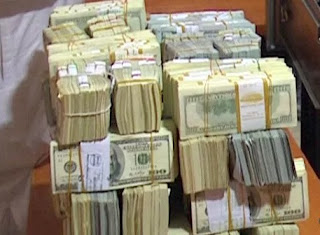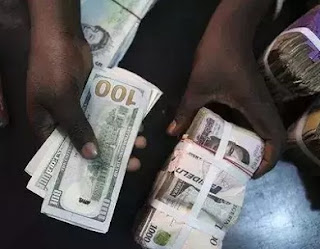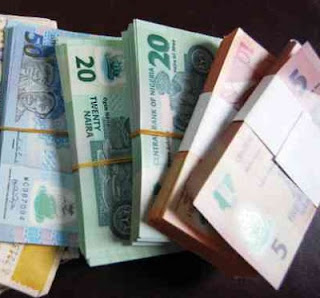'Stubborn' Naira Defies All CBN Solutions, Sinks Further Against The Dollar
The Nigerian currency, the naira has yesterday sunk further to N375 to a Unites State dollar, defying every solution meted out by the Central Bank of Nigeria to strengthen it.
in the light of incessant fall of the naira, some economists on Wednesday advised the Federal Government and the Central Bank of Nigeria to review their policies and introduce measures that would turn around the dwindling fortunes of the nation’s economy.
They spoke against the backdrop of the persistent fall of the naira against the dollar, with the local currency exchanging for 375 against the greenback at the parallel market on Wednesday; the imminent economic recession; and the spike in inflation to 16.5 per cent in June.
The Chief Executive Officer, Economic Associates, Dr. Ayo Teriba, who noted that the global fall in crude oil prices had made the nation’s oil revenue to nosedive, said there was a need for the Federal Government to seek foreign exchange from alternatives sources in order to cover for the shortfall.
He said Nigeria and its economic managers could not afford to fold their arms and allow the situation to get worsened. Rather, he said efforts must be geared towards implementing policies that would fight negative growth and inadequate liquidity at the interbank market.
Teriba said, “There are a number of things we can do as a country to boost our forex supply. Just the way India did some years ago, we can tap Nigerians in the Diaspora to contribute forex to save the situation at home. We can’t say we have done all when we have not done this.
“Billions of dollar can be raised through this. Saudi Arabia has just raised billions of dollars by issuing an Initial Public Offering on government agencies. Nigeria can raise billions of dollars in Foreign Direct Investment by issuing IPOs on government monopolies in critical infrastructure like rail, power transmission, oil and gas pipelines. There are a whole lot of things we can do to save the economy.”
A professor of Economics at the Olabisi Onabanjo University, Sherriffdeen Tella, who emphasised the need to stop the speculative attack on the naira, said the Federal Government needed to review its policies and boost local production.
He said, “All attempts must be made to increase local production, especially food items, and reduce importation of such. These, coupled with resistance to price hike, will keep prices down as the economy picks up gradually from reflationary economic policies and stable oil and electricity outputs.”
An economic analyst at Ecobank Nigeria, Mr. Kunle Ezun, said there was the need to close the gap between the exchange rates at the official and parallel markets.
He said the government must also address the spike in inflation, negative GDP growth and naira depreciation effectively and urgently.
Meanwhile, the naira tumbled further against the dollar at the parallel market on Wednesday and closed at 375, down from 368 on Tuesday.
Foreign exchange dealers said the lingering scarcity of forex at the interbank market was shifting dollar demand to the black market.
The local currency had lingered between 346 and 348 at the parallel market before tumbling to over 360 this week, following the total floating of the naira by the CBN on Friday.
The local currency, however, eased slightly against the dollar at the official interbank market and closed at 294.23 on Wednesday, up from 294.87 on Tuesday.
Dealers said the local currency was stuck at 294.23 after just one transaction was carried out, with the supply of dollars drying up and no intervention by the CBN, Reuters reported.
Highlighting the state of the interbank market, an economist at Exotix, Mr. Alan Cameron, said, “Recent FX reforms have been enough to re-open the investment case for Nigeria, but there is still some uncertainty about the functioning of the market.
“The absence of volatility at N283/$ was interpreted as a sign that administrative controls were still in place; it remains to be seen if those will be fully removed.”
According to some analysts, foreign investors have welcomed the removal of currency controls by the CBN but many are still steering clear of the Nigerian economy until it shows signs of a concrete recovery.
“Most investors would like to see a more liquid FX market before resuming purchases of local assets,” the Head of Africa Strategy at Standard Chartered Bank, Samir Gadio, told Reuters.
He, however, added, “Given the significant discount of naira-settled futures, a number of offshore financial institutions and hedge funds could be tempted to get involved in the foreseeable future.”
The Chief Executive Officer, Cowry Assets Management Limited, Mr. Johnson Chukwu, said the naira was falling at the parallel market because demand had shifted there due to lack of liquidity at the interbank market.
However, the National President, Association of Bureau De Change Operators, Aminu Gwadabe, said the naira was not sustainable at 375 to the dollar at the parallel market.
He described the demand as artificial, saying, “I think the parallel market has been taken over by some forces. Where is this demand coming from? I think this is not sustainable.”
The Nigerian currency, the naira has yesterday sunk further to N375 to a Unites State dollar, defying every solution meted out by the Central Bank of Nigeria to strengthen it.
in the light of incessant fall of the naira, some economists on Wednesday advised the Federal Government and the Central Bank of Nigeria to review their policies and introduce measures that would turn around the dwindling fortunes of the nation’s economy.
They spoke against the backdrop of the persistent fall of the naira against the dollar, with the local currency exchanging for 375 against the greenback at the parallel market on Wednesday; the imminent economic recession; and the spike in inflation to 16.5 per cent in June.
The Chief Executive Officer, Economic Associates, Dr. Ayo Teriba, who noted that the global fall in crude oil prices had made the nation’s oil revenue to nosedive, said there was a need for the Federal Government to seek foreign exchange from alternatives sources in order to cover for the shortfall.
He said Nigeria and its economic managers could not afford to fold their arms and allow the situation to get worsened. Rather, he said efforts must be geared towards implementing policies that would fight negative growth and inadequate liquidity at the interbank market.
Teriba said, “There are a number of things we can do as a country to boost our forex supply. Just the way India did some years ago, we can tap Nigerians in the Diaspora to contribute forex to save the situation at home. We can’t say we have done all when we have not done this.
“Billions of dollar can be raised through this. Saudi Arabia has just raised billions of dollars by issuing an Initial Public Offering on government agencies. Nigeria can raise billions of dollars in Foreign Direct Investment by issuing IPOs on government monopolies in critical infrastructure like rail, power transmission, oil and gas pipelines. There are a whole lot of things we can do to save the economy.”
A professor of Economics at the Olabisi Onabanjo University, Sherriffdeen Tella, who emphasised the need to stop the speculative attack on the naira, said the Federal Government needed to review its policies and boost local production.
He said, “All attempts must be made to increase local production, especially food items, and reduce importation of such. These, coupled with resistance to price hike, will keep prices down as the economy picks up gradually from reflationary economic policies and stable oil and electricity outputs.”
An economic analyst at Ecobank Nigeria, Mr. Kunle Ezun, said there was the need to close the gap between the exchange rates at the official and parallel markets.
He said the government must also address the spike in inflation, negative GDP growth and naira depreciation effectively and urgently.
Meanwhile, the naira tumbled further against the dollar at the parallel market on Wednesday and closed at 375, down from 368 on Tuesday.
Foreign exchange dealers said the lingering scarcity of forex at the interbank market was shifting dollar demand to the black market.
The local currency had lingered between 346 and 348 at the parallel market before tumbling to over 360 this week, following the total floating of the naira by the CBN on Friday.
The local currency, however, eased slightly against the dollar at the official interbank market and closed at 294.23 on Wednesday, up from 294.87 on Tuesday.
Dealers said the local currency was stuck at 294.23 after just one transaction was carried out, with the supply of dollars drying up and no intervention by the CBN, Reuters reported.
Highlighting the state of the interbank market, an economist at Exotix, Mr. Alan Cameron, said, “Recent FX reforms have been enough to re-open the investment case for Nigeria, but there is still some uncertainty about the functioning of the market.
“The absence of volatility at N283/$ was interpreted as a sign that administrative controls were still in place; it remains to be seen if those will be fully removed.”
According to some analysts, foreign investors have welcomed the removal of currency controls by the CBN but many are still steering clear of the Nigerian economy until it shows signs of a concrete recovery.
“Most investors would like to see a more liquid FX market before resuming purchases of local assets,” the Head of Africa Strategy at Standard Chartered Bank, Samir Gadio, told Reuters.
He, however, added, “Given the significant discount of naira-settled futures, a number of offshore financial institutions and hedge funds could be tempted to get involved in the foreseeable future.”
The Chief Executive Officer, Cowry Assets Management Limited, Mr. Johnson Chukwu, said the naira was falling at the parallel market because demand had shifted there due to lack of liquidity at the interbank market.
However, the National President, Association of Bureau De Change Operators, Aminu Gwadabe, said the naira was not sustainable at 375 to the dollar at the parallel market.
He described the demand as artificial, saying, “I think the parallel market has been taken over by some forces. Where is this demand coming from? I think this is not sustainable.”











